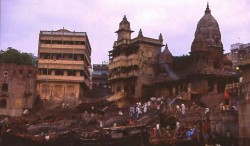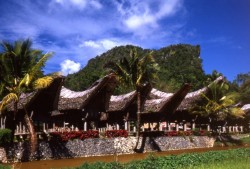
ManikarnikaGhat from the Ganges. The terraced buildings to the left and center are pilgrim sheds. The domed temple to the right, now abandoned, was built in the 18th century by Queen Ahalya Bai Holkar of Indore
It’s always six o’clock at Manikarnika. Squinting through the thick smoke of incinerating bodies, one can see the clock atop the decrepit Birla pilgrim shed which hasn’t moved in living memory. Shrouded in perpetual twilight, legend states here, at this most holy of Hindu sites on the banks of the Ganges, time never runs down but instead stands still. And so it does. Precariously rooted in the ashes of thousands of bodies burned over thousands of years, the site is reverently known as the “cradle of Vishnu.” Its origins, rumored to extend back to the beginning of creation, serve as a gruesome yet persistent reminder of life’s trembling fragility and temporary essence. Here within the ancient sacred city of Varanasi, multitudes of the Hindu pious have for millennium brought their dead to this auspicious place for cremation and ultimately their final journey from this world. Their presence and force is palpably felt within the all enveloping spectral haze. It is a place of great severity and immense profundity.
You are invited to Read More

